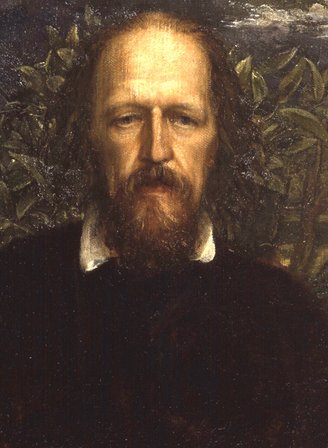Old age hath yet his
honour and his toil;
Death closes all:
but something ere the end,
Some work of noble
note, may yet be done…
That’s from Tennyson’s Ulysses. If you ever feel old and about ready to give up on life, Tennyson’s your man and Ulysses your poem: if this doesn’t get you going again, nothing will.
How dull it is to
pause, to make an end,
To rust unburnish’d,
not to shine in use!
As tho’ to breathe
were life!
Tennyson, then 24, wrote the 70-lines of blank verse within a month of hearing of the death of his best friend, Arthur Hallam. The two met at Cambridge University, philosophized and wrote poetry together, traveled to Europe several times (once on a secret mission to support rebels against the Spanish monarchy). Hallam was engaged to Tennyson’s younger sister, Emily, at the time of his death in Vienna, from a stroke. He was 22.
Tennyson’s transcendent reaction to his friend’s death was what gives the poem its unique bite and passion. He wrote later that “it gave my feeling about the need of going forward and braving the struggle of life” and “There is more about myself in Ulysses, which was written under the sense of loss and that all had gone by, but that still life must be fought out to the end.”
In the poem’s most quoted lines, the character of Ulysses as an old man scorns looking back on one’s past achievements and failures (God how I resonate!). Instead, look to the future:
I am a part of all
that I have met;
Yet all experience
is an arch wherethro’
Gleams that
untravell’d world whose margin fades
For ever and forever
when I move.
Compare this with, for instance, Shakespeare’s Macbeth, who—also in reaction to the death of someone close, his wife in this instance—sees only gloom and doom in his future (with good reason, as it turns out!):
To-morrow, and
to-morrow, and to-morrow,
Creeps in this petty
pace from day to day,
To the last syllable
of recorded time…

Alfred, Lord Tennyson, about age 60. Painted by George Frederic Watts (public domain)
The plot of the poem, such as it is, sees Homer’s Ulysses as an old man. He finally gets to return to Ithaca, his home island, from the Trojan War (ten years siege, ten battling the gods to sail home), soon to get bored with ruling “a savage race,” playing husband to “an aged wife,” and father to a dutiful son (“He works his work, I mine.”) Spousal loyalty is not in Ulysses’ playbook (despite Penelope’s 20-year loyalty to him, not knowing if he was dead or alive). To hell with that, he’s got bigger fish to fry, reminding me of that model of a deadbeat dad off to find himself: Buddha.
So Ulysses is off on
another adventure, without having anything particular in mind: T’is
not too late to seek a newer world. Good enough, so long as it’s
a challenge! Some work of noble note, may yet be done, Not
unbecoming men that strove with Gods.
If any of this sounds
familiar (and if you didn’t have to learn it at school, as dudes of a
certain age being educated in the UK did), it may be because you saw
Judi Dench reciting the last lines of the poem in the 2012 Bond movie
Skyfall. Worth repeating:
One equal temper of
heroic hearts,
Made weak by time
and fate, but strong in will
To strive, to seek,
to find, and not to yield.
CLICK TO MANAGE